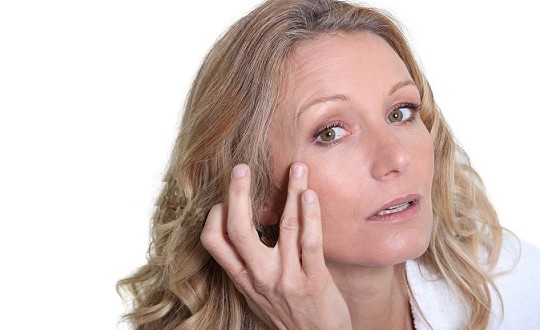Published: September 29, 2014
Wrinkles, wrinkles…. They can be more apparent when your skin is dry. They come from too much sun damage over the years and hormonal changes as your estrogen levels decrease with age. The lower estrogen levels can change your skin quality, and make wrinkles worse.
Caring for your skin as you age is important.
Keeping skin well moisturized is important as you age, since lower estrogen levels make skin prone to thinning, sagging, and wrinkling.
To combat the effects of lower estrogen levels on your skin, use moisturizer on your face, jawline and neck every day. To get the most out of your moisturizer, apply while your skin is still damp to help boost hydration.
Aging and menopause cause many changes to your skin:
- Body stops making as much collagen
- Skin’s elasticity drops due to less fat under your skin
- Dryness caused by hormonal changes, can cause sagging — especially around the neck, jawline, and cheeks
- Fine lines and wrinkles that appear are often crow’s feet and lines above the upper lip
No matter your age, it is important to wear sunscreen. Sunscreen can help in diminishing the appearance of age spots on the face, hands, and chest.
Remember the skin on your hands can lose moisture, collagen, and fat during menopause.
These changes make veins more obvious and skin more wrinkled, appearing see-through and bony. To reduce the look of wrinkles, use moisturizer often on your hands, and remember to apply sunscreen to them!
More impacts to your skin:
- Collagen gives your skin its youthful plumpness and keeps your skin tight. As your estrogen levels drop, so does the collagen in your skin.
- Eating foods with antioxidants may help make your skin stronger.
Getting enough sleep can help prevent dark circles under your eyes. - Isoflavones may help improve age-related changes like thinning skin. Soy is rich in isoflavones, (plant-based compounds that seem to act like estrogen in the body). Two 8-ounce glasses of soy milk contain about 50 mg of isoflavones.
- Stress impacts your skin. It can make your skin drier and more sensitive sometimes it can trigger conditions like psoriasis.
- Exercise helps your body and your skin. Exercise relieves stress, and boosts circulation which begins to slow with age. Better circulation and extra oxygen levels and blood flow helping your skin look brighter and healthier.
Remember a little moisturizer and sunscreen help keep your skin looking good during and after menopause.
 Red Hot Mamas In Charge of Change.
Red Hot Mamas In Charge of Change.

